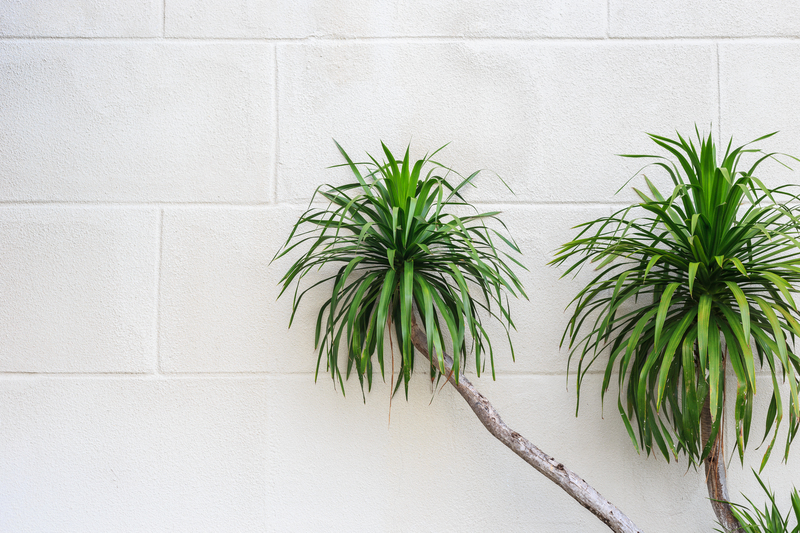Harmonize Your Outdoor Space with Zen Garden Designs
Posted on 30/06/2025
Harmonize Your Outdoor Space with Zen Garden Designs
Transforming your outdoor area into a peaceful retreat can have profound effects on your well-being and lifestyle. One timeless way to achieve this harmony is by incorporating Zen garden designs that reflect balance, tranquility, and natural beauty. In this comprehensive guide, you will discover how to harmonize your outdoor space with Zen elements, understand the philosophy behind them, and gather inspirational ideas and practical tips for creating your own serene sanctuary.
What is a Zen Garden?
A Zen garden, also known as a Karesansui or dry landscape garden, originates from Japanese culture and is deeply rooted in Zen Buddhism. These gardens are designed as meditative spaces that invoke a sense of peace and calm through simplicity, natural elements, and thoughtful arrangement.
- Emphasis on natural materials: rocks, gravel, sand, and select plants
- Minimalistic design to foster mindfulness
- Symbolic representation of nature's elements
- Purpose of promoting contemplation and inner harmony

The Philosophy Behind Zen Garden Design
The core philosophy of a Zen garden design is rooted in the concept of Wabi-Sabi-- an appreciation of the beauty found in simplicity and imperfection. By focusing on essential elements and removing unnecessary distractions, Zen gardens create a space where one can truly disconnect and achieve a sense of calmness.
Through careful arrangement of stones, raked gravel, and sparse vegetation, these gardens embody the principles of balance, harmony, and natural order. An outdoor space inspired by Zen gardens can serve as both a visual masterpiece and a sanctuary for quiet reflection.
Key Elements of Zen Garden Designs
To harmonize your outdoor space with Zen landscaping, understanding the key elements is essential. Below are the foundational components that define a traditional Zen garden:
Rocks and Stones
Rocks are the backbone of a Japanese Zen garden. They are often grouped in odd numbers and symbolize islands, mountains, or animals. The size, shape, and placement of these stones are meticulously chosen to evoke specific meanings and to promote visual balance.
- Large rocks represent mountains or islands
- Flat stones symbolize bridges or stepping stones
- Gravel and sand represent water and are raked in patterns to mimic waves
Sand and Gravel
A Zen rock garden typically incorporates sand or gravel as a central element. These materials symbolize water or emptiness and are raked into precise, flowing patterns that encourage meditation and contemplation. The act of raking can itself be a meditative practice, helping to clear the mind and instill focus.
Minimalist Plantings
While traditional Zen gardens feature very few plants, when used, they are chosen for their symbolic meaning and serene appearance. Moss, bamboo, evergreens, and small shrubs are common, providing a touch of life without overwhelming the senses.
- Moss for a soft, lush ground cover
- Bamboo for vertical interest and privacy
- Evergreens for year-round tranquility
Water Features
Although many Zen gardens are designed to symbolize water with rocks and sand, the inclusion of real water elements such as a small pond, trickling stream, or stone basin can amplify the serene atmosphere and introduce soothing sounds that enhance the meditative experience.
Pathways and Bridges
Paths made of stepping stones invite barefoot strolls and intentional movement through the garden. Simple wooden or stone bridges can offer symbolic transitions "between worlds", aiding meditation and reflection.
Ornaments and Accents
Carefully chosen ornaments--like lanterns (Toro), statues, or bamboo water spouts--add focal points to your Zen retreat while maintaining the principle of simplicity. These accents should be subtle, enhancing rather than detracting from the overall harmony.
Benefits of Adding Zen Gardens to Your Outdoor Space
Incorporating Zen garden landscaping offers numerous advantages for homeowners:
- Promotes stress relief and relaxation through mindful design
- Enhances property value with unique and attractive landscaping
- Requires minimal maintenance compared to traditional gardens
- Encourages meditation and wellness practices outdoors
- Invites biodiversity by supporting moss and shade-loving plants
Planning Your Zen Outdoor Sanctuary: Step by Step
If you want to harmonize your backyard or patio using Zen-inspired garden designs, follow these practical steps:
1. Assess Your Outdoor Area
- Measure your space and identify natural features
- Observe sunlight, shade, and existing vegetation
- Choose a location that allows for quiet contemplation
2. Define Your Vision and Purpose
- Decide if your Zen garden will serve for meditation, entertaining, or as a visual retreat
- Select a theme: minimalist courtyard, rock garden, moss garden, or water feature focus
- Consider integration with existing landscaping
3. Plan Your Layout
- Sketch a blueprint or use garden design software
- Arrange rocks, gravel beds, and plantings for optimal balance
- Define pathways and seating zones
4. Choose Materials and Plants
- Select rocks and gravel in harmonious colors and textures
- Pick drought-resistant, shade-tolerant plants suited to your climate
- Add accent features like lanterns or bamboo fountains
5. Install with Intention
- Place stones first, using odd-number groups for natural look
- Spread and rake gravel or sand to mimic flowing water
- Plant moss and selected greenery with room for organic growth
- Set ornaments and seating carefully to avoid clutter
6. Maintain Mindfully
- Regularly rake gravel or sand for neat patterns
- Trim plants to preserve minimalism
- Clean ornaments and refresh water features as needed
Tips to Harmonize Your Outdoor Space with Zen Garden Designs
To maximize the harmony and aesthetics of your Japanese Zen garden or Zen-inspired outdoor space, consider these practical tips:
- Embrace Asymmetry: True Zen gardens avoid perfect symmetry. Arrange elements off-center or in odd numbers for a more natural feel.
- Use Natural Boundaries: Enclose your retreat with bamboo screens, hedges, or stone walls to create a sense of seclusion.
- Focus on Views: Frame specific vistas with rocks or plants, encouraging visitors to pause and appreciate the scene.
- Integrate Seating: Add a simple wooden bench or stone slab to allow contemplation and relaxation.
- Limit Color Palette: Stick to subdued greens, grays, and earth tones to maintain calmness and cohesion.
- Incorporate Lighting: Use soft, ground-level lights or lanterns for nighttime ambiance and safety.
Popular Styles of Zen Garden Designs for Outdoor Spaces
Depending on your available space and personal taste, choose from these beautiful Zen-inspired layouts to harmonize your backyard, patio, or courtyard:
Traditional Rock and Sand Garden
Ideal for small or urban spaces, this style highlights carefully placed rocks surrounded by meticulously raked sand or gravel, with minimal plantings or adornments. It offers a truly minimalist Zen garden experience.
Moss and Stone Sanctuary
A lush carpet of moss interspersed with stones creates a dreamy, shaded oasis--perfect for tranquil mornings or meditation. Add a small bonsai or stone lantern for gentle accents.
Bamboo Courtyard
Enclose your patio or deck with clusters of bamboo and feature a stone basin or bamboo water spout for the soothing sounds of trickling water. This contemporary Zen garden design is both private and peaceful.
Water Feature Focus
If space allows, adding a koi pond, reflecting pool, or stream can create mesmerizing movement and attract wildlife. Integrate stepping stones and minimalist planting around the water's edge.
Modern Zen Retreat
Blend traditional Zen garden principles with contemporary aesthetics by using geometric stepping stones, concrete planters, and clean architectural lines softened by moss and sculptural rocks.
Inspiring Ideas for Small Urban Outdoor Zen Spaces
- Tabletop Zen Garden: Use a shallow tray with sand, tiny rocks, and a mini rake for desktop relaxation.
- Zen Balconies: Line railings with bamboo screens, add a pebble carpet, and place a small bench or floor pillow for yoga or tea.
- Container Moss Gardens: Grow moss or ferns in pots with slate or granite accents for miniature Zen ambiances.
- Corner Meditation Nook: Section off a shady corner with stepping stones and a Buddha statue to provide a dedicated outdoor retreat.
The Art of Zen Garden Maintenance
Maintaining your harmonious Zen outdoor space is mostly about preserving simplicity and intention. Here's how you can keep your garden looking serene year-round:
- Regularly rake sand or gravel to refresh patterns
- Weed by hand to prevent invasive growth without chemicals
- Trim moss or groundcovers as needed, keeping shapes organic
- Clean and inspect water features to avoid stagnation
- Replace cracked or aged ornaments to sustain a polished appearance

Eco-Friendly Zen Garden Tips
A sustainable Zen garden not only harmonizes your space but benefits the environment. Consider these green ideas:
- Use native plants and drought-tolerant species to reduce watering needs
- Source rocks, sand, and gravel locally for minimal ecological impact
- Opt for solar-powered lanterns for energy-efficient nighttime lighting
- Compost fallen leaves and organic debris for natural fertilizer
- Harvest rainwater for small water features and irrigation
Conclusion: The Lasting Value of a Zen Garden in Your Outdoor Space
A Zen garden design offers more than just visual appeal; it creates a living sanctuary that nurtures the senses and soul. By weaving together natural elements, thoughtful layouts, and the core principles of balance and simplicity, you can elevate your outdoor area into a haven of peace and mindfulness.
Whether you own a sprawling backyard or a cozy balcony, the harmonizing power of a Zen-inspired outdoor space can bring restorative calm to your daily life. With mindful planning, genuine intention, and ongoing care, your Zen garden will stand as a lasting symbol of tranquility and thoughtful living.
Begin your journey today--create a Zen garden retreat that reflects your inner harmony and enhances the outdoor beauty of your home.
Latest Posts
Eco-Gardening: Planting the Seeds for Climate Protection
Unlocking the mysteries behind vibrant orchid petals
Designing a Garden that Oaks Wind with Elegance

